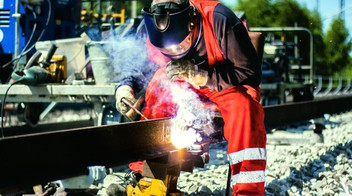Digitalization and innovation
Digitalization is already an important factor in the German local transport market today. The increasing demand for integrated mobility concepts, the growing importance of passenger information, and sustainability efforts create positive momentum for innovation and digital solutions. In some parts, these innovations are driven by the tender, passenger or supplier market. In addition, DB Regional itself is a driving force in innovation as innovation leader.
In this context, DB Regional has solidified its role as the market leader through a consistent digitalization strategy. The focus is on customer innovation needs, for example in the area of integrated mobility or personalized passenger information, as well as potential for the further development of core processes, which are strengthened by the automation and use of new technologies in terms of performance capability, speed and efficiency. DB Regional aims to create innovative digital solutions that quickly create visible, specific added value and meet demand. The cooperation of the DB Regional Rail and DB Regional Road lines of business in 2023 – including at the IT level – particularly supports the strategic direction of integrating mobility services in urban and rural areas more strongly and aligning them to specific needs.
The digitalization of DB Regional is sustainable: specific applications in the area of green IT, an environment-oriented approach to the procurement, development, use and disposal of computer hardware and software applications, are making a measurable contribution to achieving the climate protection targets.
The following progress was made in 2023:
- Train portal: The DB Zugportal (DB Train Portal) app was scaled further across Germany in 2023. The continuous expansion of functions and user experience results in constant reach growth and a consistent user base for the app.
- Route agent: The DB Streckenagent (DB Route Agent) app directly benefits customer satisfaction with digital services for improved passenger information. The app users receive an easy and intuitive app with real-time information about delays and alternative routes via push notifications. In 2023, the Germany-Ticket and the first multimodal services were integrated into the app.
- Digital maintenance: AI-supported camera portals, mobile robots and digital wheel set measuring systems enable a more efficient maintenance and ensure that the trains are available to passengers more quickly. In the future, for example, up to 20 hours of time-consuming routine work can be omitted per S-Bahn (metro) facility every day, and more capacity will be created for the targeted maintenance of the growing vehicle fleets. The S-Bahn (metro) facility in Munich-Steinhausen is a pilot facility for digital maintenance at DB Regional. Munich’s S-Bahn (metro) fleet alone grew by 16 to 289 vehicles in 2023, which are additionally being serviced in Steinhausen.
- Cell reception: In 2023, the first DB Regional trains were deployed with windows that had been altered using a laser to make them permeable to mobile signals. This is improving cell reception on trains by 100 times. This is a pilot project for which further transport associations and contracting organizations are to be sought as partners. Passengers on the Südostbayernbahn (Southeast Bavaria Railway) and the Elbe-Spree network are currently benefiting from this.
- Real-time utilization displays: On the first regional transport lines, the utilization rate of each carriage is determined and passed on directly to customers on the platform, on board the vehicle, and on the app. The utilization indicators are made possible thanks to a comprehensive capacity management system.


